Column:: Thoughts from Dr. Joe: Idea of majoring in liberal arts given short shrift, to our detriment

- Share via
Students transitioning from high school to college often ask me about the many possible majors available at their intended universities. Although selecting a major shouldn’t be taken lightly, college is an opportunity to explore new ideas and possibilities.
Rarely do I offer advice, but even when I do, I throw up my hands and exclaim, “What do I know?”
When I was in college, I had a different major every week. Why not? They all sounded so exciting. However, at the beginning of my junior year, I decided to major in classical studies. I was excited to tell my parents I’d at last arrived at my decision.
“Hey Dad, I finally decided on a major.” He waited for the punch line. He thought it was a joke.
“I’m going to major in the classics and minor in philosophy,” I said.
He looked at me as though I was out of my mind.
“You’ll never get a job,” he replied.
I told him that I already had a job. I’d joined the Marines.
In my conversations with students, I often suggest that having a strong liberal arts background is an excellent adjunct to medicine, engineering, law or business. Once in a blue moon I’ll go out on a limb and suggest the classics.
It’s easy to dismiss classical studies as a college major. The discipline comprises tattered old books, antiquated ideas and a language that has been dead for centuries. Today, when pragmatism reigns over old-school thinking, where is the relevance for contemporary life? Though society focuses more and more on pragmatism, the soul does not.
Classics are interdisciplinary. History, language, literature, theology, anthropology, architecture, art, philosophy, etc. provide a broad education that’s a complement to any field. The study is rigorous since students learn to master complex information, analyze and synthesize material and thoroughly formulate cogent arguments and communicate precisely and concisely both in writing and speaking.
The classics provide perspective. Understanding what happened in Athens in the 5th century BC, we begin to understand that near and far, familiar and foreign, are just a matter of perspective.
Today, it’s apparent that economic and practical value are the only essential values in society. The classics can’t compete in a world of pragmatism. If I hope to gain admission to a “Tier 1” law school, why would I study ancient philosophy if it’s not part of the LSAT? If I want to be a doctor, it will make more sense to study medicine than literature. If I want to study language, shouldn’t I choose one with more speakers than just the pope?
In a contemporary culture that ignores the classics and venerates immediate utility, it’s easy to learn how to be a robot rather than a human. Complex and omnipotent technologies are slowly becoming acceptable replacements for human intuition. The value of classics lies in changing this. Its power to teach from compelling examples, its universal reach and its ability to make us feel less insignificant will make it forever relevant. Joseph Campbell says, “We all seek the experience of being human.”
Learning to be human through the classics we see how many of the problems faced today have cycled throughout history. Many of the ancients prescribed underlying moral codes that help us find correct answers to difficult questions. The ancients debated the value of life and the reason for existence in a way that remains pertinent. We attempt to explain something relevant to us but are unable to articulate the idea. However, we can study the road map the classics created and use it to define who we are to ourselves and others.
The classics examine the heart of a sculptor with the ability to chisel the Pieta out of stone.
Joe Puglia is a practicing counselor, a retired professor of education and a former officer in the Marines. Reach him at doctorjoe@ymail.com. Visit his website at doctorjoe.us.
